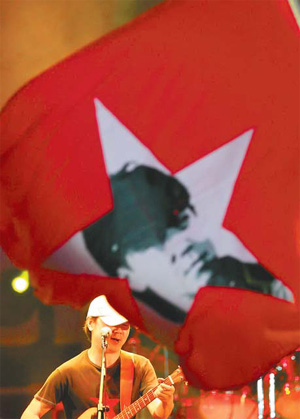Cui Jian's rock no longer rolls
In March 1989, 27-year-old Chinese rocker Cui Jian gave a concert titled Rock 'n' Roll on the New Long March at the Theater of Beijing Exhibition Hall, just after releasing his groundbreaking album of the same title.
Along with Zhang Yimou's film, Red Sorghum, which won the Golden Bear award, and the China Contemporary Art Exhibition that witnessed an artist shooting his own work, Cui's concert became one of the most important cultural events of the 1980s. It was staged at a time of great creativity catalyzed by China's opening-up.
Twenty years later, on Christmas Eve, Cui returned to the Theater of Beijing Exhibition Hall with a concert titled Rock 'n' Roll on the New Long March V21, indicating he is still continuing his long march in the 21st century.
When Cui asked the audience how many of them were at his concert 20 years ago, about one fifth raised their hands.
As for the teenagers in attendance, most of whom came with their parents, it was obviously not their cup of tea. Not long after the concert started, two young girls sitting in front of me began to read electronic books on their cell phones, ignoring the excited middle-aged people around them.
|
|
|
After leading Chinese rock for more than 20 years, Cui Jian seems to be losing his creativity and sharpness. [Tian Fei] |
Although Cui declared he didn't want the concert to be a nostalgia party, the song list, from Nothing to My Name to A Piece of Red Cloth, featured all old tunes and no new songs.
The classics were what most of the audience wanted, which jumped to the beat as if to follow the lyrics of Night of the Era: "All we can do is satisfy our physical demand".
I don't know about the rest of the audience, but my own nostalgia vaporized in the cold capital city winds after I left the theater.
I was not in Beijing in 1989, but I clearly remember the first concert of Cui I attended. It was at the Tianjin People's Indoor Stadium in January 1993. There was no publicity before the concert, and almost a quarter of the seats were taken by police, but Cui and the audience almost blew up the stadium.
The spiritual and physical thrill of the concert lasted at least a week, and I can still feel it today. In the rather conservative atmosphere of the early 1990s, Cui's music was revolutionary, as he delivered a spirit of individuality. The next day, even the DJ on the radio spoke with a raucous voice because he had been singing along with Cui the previous night.
At that time, Cui represented an apex of Chinese rock music. He not only creatively mingled Western and Chinese musical languages but also spoke out about a new generation of Chinese society and culture.
Cui's name has always been linked with the social environment, be it good or bad. When I moved to Beijing in the late 1990s, Cui seemed to have disappeared from public view. Although the rumor that he was banned was never verified, he did not hold a concert in a big venue in Beijing for more than 10 years, after a show in 1993.
Instead, Cui could only be seen as a guest musician at concerts of visiting foreign musicians, like Udo Lindenberg, Deep Purple and the Rolling Stones. For a period of time, he almost became a professional guest musician.
In 1998, I saw a small but crowded gig by Cui at the CD Cafe of Beijing. The performance was exciting, not only because of its underground status, but also because Cui was still composing thought-provoking works.
Cui, however, seems to have declined since then. He has written fewer new songs. His fusion of rap and electronic music was not very successful. Compared to his early lyrics, many of which became catchwords in the 1980s and 1990s, his lyrics are now hard to remember. In his latest album, Show You Color, which came out in 2005, seven years after the last one, most of the songs seemed to have become soft and sentimental.
I had expected that Cui would surprise us with some new songs at the Christmas Eve concert, since they were often performed live before being recorded. However, the newest songs were Blue Bone and The Lost Season, which were from the 2005 album, and composed around 2000.
Cui has held large-scale concerts in Beijing three times since 2005. He has been involved in films, initiated the "live vocals" movement and been dubbed "China's godfather of rock 'n' roll". Yet his music seems to have lost its sharpness. At a time when rock music has become part of the KTV repertoire and alternative lifestyles have flowered, Cui's critical stance seems blunted.
Maybe we should not ask too much from Cui, who is nearly 50. And who else is making original rock 'n' roll music? Where are the pioneering groups like Tang Dynasty, Black Panther and Zang Tianshuo?
Cui opened his Christmas Eve concert with a song titled Start Again. Maybe it's also time for Chinese rock music to do exactly that.
 0 Comments
0 Comments








Go to ForumComments